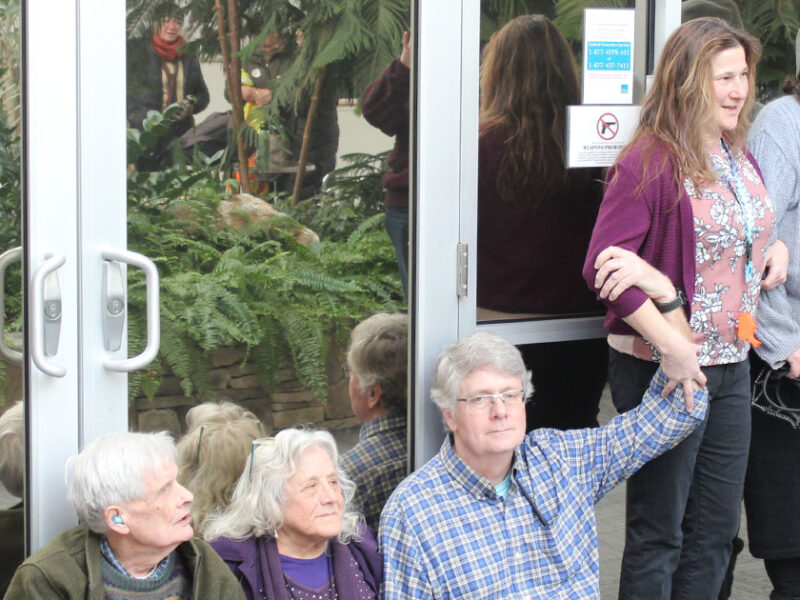This short series, Middlebury College is Failing its Transgender Students, is separated into three parts. Part 1 can be read here. Part 2 is below. Part 3 can be read here.
Evelyn Mae Sorensen, the oldest of three children, came from a single-parent household and worked several jobs to support herself. She enjoyed biking, photography, and mountaineering, and she was active in advocating for improved mental health services on campus for marginalized and LGBTQ+ communities. From the start of her time at Middlebury College in 2021, she did not feel supported and found a lot to be desired about the school, but she tried to stick it out.

Sorensen was a trans woman and a straight-A student who pursued her two main interests with a double major in Geology and Gender, Sexuality, and Feminist Studies. Sorensen also struggled with mental health and substance use disorder, both more prevalent in LGBTQ+ communities due to discrimination and marginalization, and had maintained sobriety for an extended period of time.
As VTDigger reported, at one point in 2023, Sorensen told her medical providers on campus that she was looking to order fentanyl. She told her mother she had brought some to campus, but claimed to have thrown it away without using it, as she was undergoing suboxone treatment. Without any conversation or process, Middlebury’s Dean of Students, Derek Doucet, evicted Sorensen from her dorm, giving her only four and a half hours to pack her things and catch a flight to the West Coast. Sorensen’s health team, however, believed that staying in Vermont would be her best option to stay in recovery, so she became homeless, staying at a homeless shelter in Middlebury. Residents, mostly older men, pressured her to take drugs.
In a text to her mother after Middlebury evicted her, Sorensen wrote, “I haven’t slept a whole night since Derek [Doucet] kicked me out. I’m sick, weak, lost so much weight my ribs are showing. My mental health is the worst it’s ever been.” After about two months of homelessness, Sorensen was allowed back on campus. In September, a few months later, she totaled her beloved bike and was hospitalized with a concussion and a broken tooth. Nobody from the college checked up on her, even when she returned to campus, and she overdosed and died in her dorm room a few days later. It took campus staff three days before they performed a wellness check and found Sorensen’s body. Sorensen would have graduated this past June.
Sorensen’s mother shared with VTDigger how poorly the college treated not just her daughter but her as well. Sorensen’s room was packed and sanitized before she had a chance to say goodbye, and she found that many of her daughter’s items, which had been brought to the Scott Center for Spiritual and Religious Life, were damaged or missing. During a school-sponsored vigil for Evelyn, Mark Orten, the Dean of Spiritual and Religious Life and College Chaplain, censored Sorenson’s mother, threatening to cancel the vigil if she didn’t rewrite her comments criticizing the administration and the college, highlighting the harsh reality that the college does not extend its ideals of “free speech” to grieving mothers.
In response to the college’s poor treatment of Sorensen, even in death, Sorensen’s friends planned their own public vigil, protesting Middlebury’s poor mental health services and treatment of Sorensen. They also created an Instagram account titled nomoredeadmiddkids, highlighting anonymous stories of students’ lack of support from the college for their mental health. One student shared that Doucet and Residential Life denied their request to stay on campus during winter break, despite their explanation that their home life was unstable and unhealthy. One queer and BIPOC student shared that they looked for a sense of belonging at the campus but ended up “feeling isolated and not __ enough.”
Students also called for the college to stop using the virtual counseling app TimelyCare, a Texas-based therapy service operating out of one of the most transphobic states in the country, that provided students with thirty minutes of therapy with a rotating cast of random, out-of-state therapists, who often lacked any context regarding what students on campus were facing. Students also asked the administration to increase BIPOC and LGBTQ+ counselors on campus, explaining how students in these two identity groups consistently felt under-supported and isolated. In the spring of 2024, the administration responded by hiring two part-time remote therapists from marginalized backgrounds, who provided a total of only 43 counseling sessions for students over the semester, a fraction of what was needed on a campus of more than 2,700 students.
Middlebury College’s main counseling goal is to support students in finding long-term therapy off-campus, which can be challenging for students without a car. Telehealth is difficult for those who share a room. Because of high demand and a lack of therapists on staff, counselors on campus are only available for “short-term individual therapy,” and the job position as listed repeats that counselors are hired specifically for “short-term counseling, crisis intervention, and mental health outreach services.”


One Middlebury alum, Z, who asked to remain anonymous due to the campus community being so small, told The Rake that the college failed to adequately support Sorensen’s friends, the Middlebury LGBTQ+ community, or even respond to the extra requests for support after Sorensen’s death. This lack of support included an unwillingness to mandate flexibility for students personally impacted, no commitment to cancel classes to allow people to mourn, and no willingness to overhaul Middlebury’s inadequate crisis support system. One part of that system, a peer-support phone line called MiddSafe, in which students were given a $500 stipend and two weeks of training as a certified rape crisis worker, shut down in September after use plummeted. Some students who worked at MiddSafe blamed the usage drop on a lack of consistent promotion and support by Middlebury staff.
Z also shared that they witnessed professors responding to grieving students with callousness, telling them to consider medical leave instead of providing or finding necessary support. While the administration promised to allocate millions of dollars towards robust mental health support, they are now considering spending millions to build an adult playground. The Rake emailed Middlebury College multiple times asking what, if any, extra support was given to LGBTQ+ students after Lia Smith’s death in October or Sorensen’s death in 2023. The school did not respond to requests for comment.
Z also suggested that the 2024 Senior Class gift of $20,000 for mental health has not been accounted for and that the administration offered no transparency about how it was used. Laurie Essig, a professor of Gender, Sexuality, and Feminist Studies said that professors were “told not to focus on [student deaths] and just move on…because otherwise [there] could be a copycat.”
Essig often ignored the advice to just move on. She, along with the Gender, Sexuality, and Feminist Studies faculty, were deeply impacted by the deaths of Sorensen, who was a major in the program, and Smith, who lived in academic housing. She said that counseling for LGBTQ+ students, as well as Sorensen and Smith’s friends, has been outsourced to queer faculty and staff.
“I feel like what I do is a lot of amateur therapy,” she said. “People are coming to my office and collapsing.” While Essig feels she shouldn’t be stepping in as an informal counselor, she says there aren’t official resources meeting that need. “The grief was horrifying,” she said, later adding, “This is multiple deaths, and even one is just so devastating and so heartbreaking and too much.” Rather than ignore the real mental health crises facing students, she has turned to Kate Bornstein’s Hello Cruel World: 101 Alernatives to Suicide for Teen Freaks and Other Outlaws to “think about what are the reasons trans women, trans men and genderqueer people need to survive right now.”
The weight of this work, combined with a lack of support from the college, has felt devastating to Essig. “These students need me, but also I need an institution that provides the resources that trans and queer kids need.” And students have advocated for their own needs. “Part of what they’re saying is so obvious. We need the college to acknowledge that this is happening. We need half a day of all getting together to discuss this. We need grief counselors. They want more counseling services. These seem like reasonable asks.”
“I’m an adult. I’m an old ‘dykosaur.’ I have survived a lot of discrimination in my life, including in Russia. But, you know, I don’t know that I have the skill to do this,” Essig said.
Middlebury College Coddles Far-Right Professors Over Protecting LGBTQ+ and BIPOC Students and Faculty
Over the last eight years, Middlebury College has faced controversy for platforming white supremacists and those who peddle dehumanizing and fascist language as “diverse opinions” under the guise of “free speech.” In reality, the far-right has weaponized freedom to shut down any real discussion of the responsibilities and harms of political speech. What white supremacists like Charlie Kirk laud as “collegial debate” are opportunities for them to insert their ideological bedfellows into lopsided conversations with students.
Essig questioned the “free speech” logic of the far-right on campus, wondering if the Hamilton Forum would platform Nick Fuentes, a white supremacist recently defended by President Trump, or whether the college would let her read aloud the SCUM Manifesto, a controversial radical feminist text from the 1960s that calls for overthrowing modern society by eliminating all men.
Essig also pointed out how Middlebury College has a very uneven response to protests. Middlebury allowed the Women’s Center, a crisis pregnancy center, to attend a college fair a few years ago. Crisis pregnancy centers provide misleading information to pregnant people considering abortions, often because of a religious motivation to prevent abortion. Student protests were restricted to a small free speech zone far from the event.
Last month, students accused new Middlebury College President Ian Baucom and the administration of intimidating and silencing them for handing out pamphlets critical of the Language School’s 70-plus-year relationship with the Central Intelligence Agency, which often uses Middlebury as a recruiting ground for new agents.
Essig, in her limited spare time, organizes other gender studies departments in opposition to the Trump administration. She has spoken with other chairs of gender studies departments at fellow NESCAC schools, and what she noticed was an egregious “animosity towards protest” at Middlebury. Middlebury’s prestigious designation as a “little Ivy” with a $1.5 billion endowment has also attracted national attention for its protests against far-right figures.
Middlebury political science professor Keegan Callanan has parlayed this anti-left protest sentiment into a lucrative career. After Charles Murray’s disastrous on campus talk in 2017, Callanan published an op-ed in the The Wall Street Journal defending “free speech” and launching Callanan into the national spotlight. He took advantage of the opportunity to raise funds from conservative billionaires, including the Koch Family, to start the Alexander Hamilton Forum. Initial committee members included political science professors Murray Dry, Jim Douglas, and Allison Stanger.
A year later, Callanan was nominated by Trump to become a member of the National Council on the Humanities. Earlier this year, Callanan was one of only four members Trump kept on when he returned to power. In April, the Trump administration ended all current grants from the National Endowment for the Humanities, redirecting funds to President Trump’s patriotic programming agenda, saying that they will no longer promote “extreme ideologies based on race or gender.” Callanan has not publicly spoken out against this attack on free speech.
Since its inception in 2017, the Hamilton Forum and its members have created a campus environment that has left many staff and professors of marginalized backgrounds feeling unwelcome.
Among those staff members was Marissel Hernández-Romero, a former assistant professor of Spanish and Portuguese who taught at Middlebury from 2017 to 2020. In a scathing community-wide email where she detailed her experiences with racism at the college, she accused the college of ignoring and oppressing people of color by expecting them to assimilate into a hostile culture of whiteness without professional or personal support.
Hernández-Romero’s sharpest criticism was aimed at an institution that claimed to advocate for faculty of color while protecting faculty who defend “the continued and uninterrogated comfort of privilege under the guise of ‘free speech.’” This refrain was commonly heard among Middlebury alumni who spoke with The Rake. Hernández-Romero alleged that at one faculty meeting in 2017, Murray Dry subtly threatened non-white faculty by implying that “challenging white privilege will bring worse consequences.”
Dry is no stranger to far-right politics. In 2013, he published an editorial opposing the use of affirmative action to hire faculty. In 2015, Dry wrote an article for the Vermont Law Review in which he recommended that gay people should only be allowed to marry each other “as long as same-sex couples were going to live together and have children,” and that marriage equality based on procreation or child-rearing should be a state’s rights issue. One former trans student told us that Dry, who said that he was happy to see the platforming of transphobes in February after Wu and Saphir’s appearance, was “famously unfriendly to trans people in his classes.”
Several ratemyprofessor.com reviews describe Dry as someone who is either unable or unwilling to become culturally competent and sensitive. One review stated that “he is biased towards specific identities and lacks any sort of cultural competency.” Another review from 2024 said that “he is rude and picks on students who struggle,” especially singling out students of color who are not native English speakers. An independently created student website called the “Disorientation Guide” claimed that Dry was “famous among students for his bountiful sexism.”
At a college constantly invoking “free speech,” Hernández-Romero’s email was deleted from servers and removed from individual inboxes within two hours.



